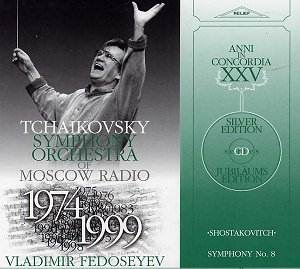Relief’s never less
than fascinating catalogue of Fedoseyev
performances continues with this Shostakovich
‘War’ symphony, the Eighth. This is,
ultimately, a frustrating Eighth that
gains interpretative depth and momentum
as it goes along. At the end, one does
feel that one has been in the presence
of genius (Shostakovich, not Fedoseyev),
yet try starting the disc again and
it is another story.
True, the recording
quality lends the strings a thinness
in the first movement that hardly helps,
yet it remains a fact that a more true
to the spirit account would have shone
through this limitation. Along the way
(and this is a relatively extended movement
– 24’38), there are some touchingly
brooding wind solos (an outstanding
cor anglais in Said Agishev), and a
brazen march around the quarter of an
hour in does little to dispel the prevailing
loneliness of this score.
The recording presents
a block to full enjoyment of the second
movement, also: Fedoseyev and his Moscow
forces play this march-scherzo with
all the dynamism one could wish. If
only it was presented with more space
and depth, it would be altogether a
more impressive achievement.
It is with the third
movement, however, that we have take-off.
The relentless tread is superb (only
trombones at 1’53 sound cautious). Trumpets
(around 3’40) sound almost as if they
are at the circus and towards the end
of the movement there is heart-stopping
excitement. All that was there in embryo
in the earlier movements struggling
to get out reaches maturity here. No
surprise, then, that the underlying
disquiet in the stillness of the Largo
is magnificent. Shostakovich’s scoring
is well-realised: try the spectrally
spooky flutes, for example. The overall
conception of the finale, also, does
not fail to disappoint, despite a couple
of uncertain moments.
Mravinsky, the work’s
dedicatee (and who premièred
the symphony in November 1943), is available
on BBC Legends BBCL4002-2,
the orchestra the Leningrad Philharmonic,
a performance given in the Royal Festival
Hall in September 1960. This remains
preferable to Fedoseyev who, whatever
the power of individual moments in his
reading, fails to make the work cohere
as an individual statement.
What a shame, also,
that Fedoseyev’s audience feels compelled
to applaud immediately at the close,
breaking the atmosphere.
Worth having as a supplement
to the Eighths already extant in one’s
collection, possibly, but unrecommendable
as the only one.
Colin Clarke

![]() Tchaikovsky Symphony Orchestra of Moscow Radio/Vladimir
Fedoseyev.
Tchaikovsky Symphony Orchestra of Moscow Radio/Vladimir
Fedoseyev.
![]() RELIEF CR991056 [60’20].
RELIEF CR991056 [60’20].